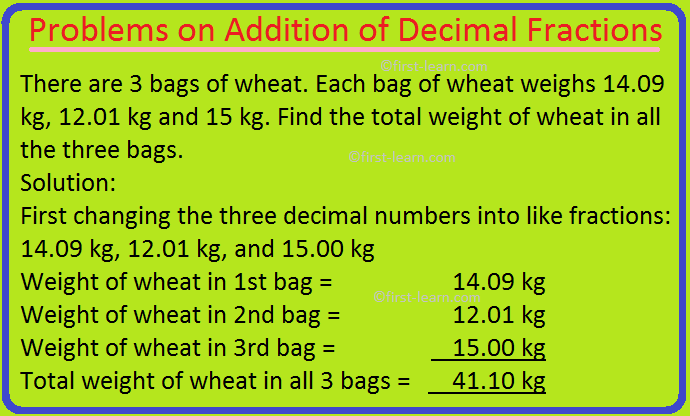Problems on Addition of Decimal Fractions
This topic would deal with problems on addition of decimal numbers. We already know that for adding decimal numbers we need to first change those decimal numbers into like fractions and then need to put in proper columns with decimal point of all the numbers in single vertical line. Then we have to do the addition ignoring the decimal point. After calculation is done we need to place the decimal point in proper place. Here we will learn this addition of decimal numbers but it is given in form of story sums. Learners have to understand the problem given and then write proper statement along with the addition.
Here are few examples on problems of addition:
1. There are 3 bags of wheat. Each bag of wheat weighs 14.09 kg, 12.01 kg and 15 kg. Find the total weight of wheat in all the three bags.
Solution:
First changing the three decimal numbers into like fractions:
14.09 kg, 12.01 kg, and 15.00 kg
Weight of wheat in 1st bag = 14.09 kg
Weight of wheat in 2nd bag = 12.01 kg
Weight of wheat in 3rd bag = 15.00 kg
Total weight of wheat in all 3 bags = 41.10 kg
The weight of wheat in each of the three bags is given. So we need to add the weight of each bag of wheat to get the total weight of wheat in all the 3 bags.
2. The rainfall of three months of the year is given:
June 25.40 cm
July 15.40 cm
August 5.2 cm
Find the total rainfall in these 3 months of the year.
Solution:
First changing the three decimal numbers into like fractions:
25.40 cm, 15.40 cm, 5.20 cm
Rainfall in the month of June = 25.40 cm
Rainfall in the month of July = 15.40 cm
Rainfall in the month of August = 5.20 cm
Total rainfall in all three months = 46.00 cm
The rainfall of each of the 3 months of the year is given. We need to add the rainfall of each of the months to get the total rainfall.
3. Alex for reducing weight plans to walk every morning. The daily distance covered by Alex in 5 days a week is:
Monday = 500.50 m
Tuesday = 450.21m
Wednesday = 754.23 m
Thursday= 621.74 m
Friday = 200 m
Find the total distance covered by Alex in 5 days a week.
Solution:
First changing the 5 decimal numbers into like fractions:
500.50 m, 450.21 m, 754.23 m, 621.74 m, 200.00 m
Distance covered on Monday = 500.50 m
Distance covered on Tuesday = 450.21 m
Distance covered on Wednesday = 754.23 m
Distance covered on Thursday = 621.74 m
Distance covered on Friday = 200.00 m
Total distance covered by Alex in 5 days = 2526.68 m
For reducing weight Alex walks every morning. The distance covered by Alex in 5 days a week is given in decimal. We need to find the total distance covered by Alex in 5 days and hence need to do addition.
From Problems on Addition of Decimal Fractions to HOME PAGE
Recent Articles
-
Plants Around Us | Big & Small Plants | Shrubs & Herbs | Water Plants
Feb 03, 26 02:01 AM
We see different types of plants around us. Plants are living things. They breathe and grow. They also reproduce. Most of the plants grow on land. Some plants grow in water. -
Formed Elements of Blood | Erythrocytes | ESR |Leukocytes |Neutrophils
Jan 15, 26 01:25 AM
Formed elements formed elements are constitute about 45 % of blood afeias haematocrit value packed cell volume mostly of red blood corpuscles and are of 3 types- erythrocytes, leukocytes and blood pla… -
What Is Plasma? | Blood Plasma | Proteins | Nutrients | Cholesterol
Nov 07, 25 10:29 AM
Blood is a mobile fluid which is a connective tissue and is derived from the mesoderm like cell any other connective tissue. Colour of blood is reddish and that flows inside the blood vessels by means… -
Disorders of Respiratory System | Tuberculosis | Pleurisy | Emphysema
Oct 28, 25 11:39 PM
Tuberculosis is very common disease and is caused by a type of bacteria called Mycobacterium tuberculosis. This disease causes different trouble in the respiration and infection of several parts of th… -
Regulation of Respiration | Respiratory Centres | Inspiratory Area |
Oct 14, 25 12:13 AM
Respiratory Centre is the area that controls the rate of respiration and it is observed to be located in medulla oblongata and pons. Respiratory Centre has the following will dispersed components like…






New! Comments
Have your say about what you just read! Leave me a comment in the box below.